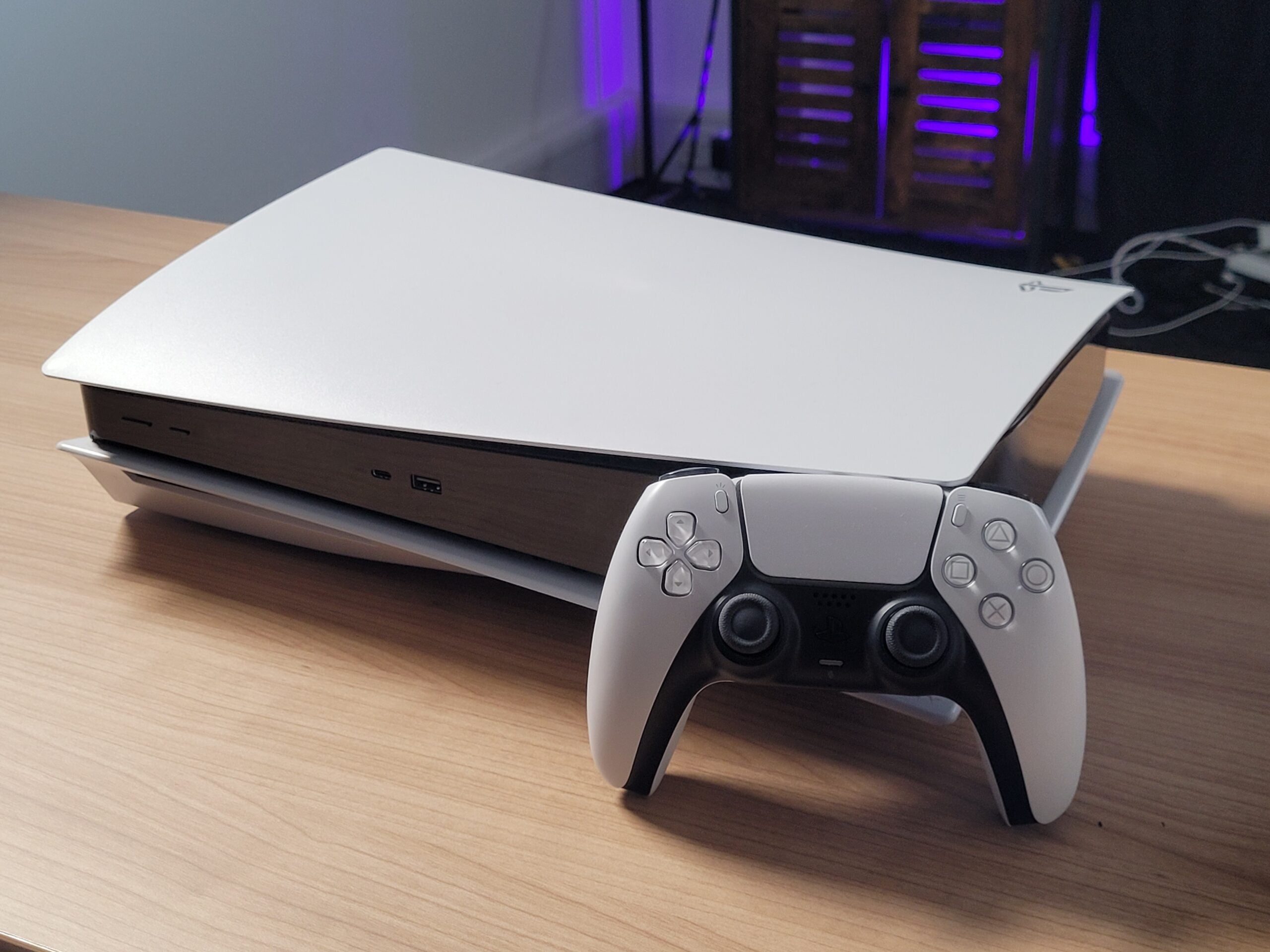Verdict
The original PS5 is a meaningful evolution of Sony’s achievements with its predecessor, even if it is now being phased out by a slimmer model with a removable disc drive. It’s a gorgeously accessible machine that’s been modernised with nuanced SSD technology and 4K-capable graphics power. Combine this with a compelling user interface, the selection of exclusive experiences and a general ecosystem that embraces what came before it, and you get an accomplished and well-rounded console offering.
Pros
- Absurdly powerful
- User interface is refined, accessible and easy to use
- DualSense controller feels like a true leap forward
- Backwards compatibility for PS4 games
Cons
- The console is overly bulky
- Lags behind Series X and S when it comes to loading times
Availability
- UKRRP: £479.99
- USARRP: $499.99
- EuropeRRP: €549.99
- CanadaRRP: CA$649.99
- AustraliaRRP: AU$799.95
Key Features
-
Capable of 4K resolution:Can play supported games at an ultra-sharp 4K resolution, offering far more detail and image sharpness than the PS4. -
Supports ray tracing:The new ray tracing technology allows for enhanced in-game lighting and reflectiong. -
Super-speedy SSD:The integrated SSD allows the PS5 to blaze through loading screens. You’re also able to upgrade the SSD storage if needed.
Introduction
The PS5 launched over three years ago now. In that time, it amassed a large game library, seen several software updates and even seen some hardware revisions such as the introduction of faceplates and a new PS5 Slim model.
Sony’s latest console also boasts several significant upgrades over the preceding PS4, with a faster graphics chip to ensure a smooth 4K performance and speedier SSDs that has all but eradicated the archaic loading screens,
But that doesn’t mean it’s all been plain sailing for the PS5. It would be fair to argue that Sony is yet to take full advantage of the new hardware due to its desire to ensure many of the new first-party games are also available on PS4. Plus, while the graphics boost is welcome, it’s not quite so striking as previous generational leaps.
With all of that taken into consideration, is the PS5 worth a buy in 2024? We’ve revaluated Sony’s console 3 three years on to answer that very question. Keep reading for my full verdict.
Design and connectivity
- It is huge, and the slimmer model now exists with a better port selection
- Can be fitted with more colourful faceplates
- Can be installed with an M.2 SSD to expand storage
The first thing to note about the PS5 is that Sony has now introduced a new PS5 Slim model, which will replace the original chunkier model (pictured below) in stores. We unfortunately haven’t been able to test the new PS5 Slim model just yet, but the only key changes you need to be aware of is that the Slim edition has a slimmer design and a detachable disk drive.
While the original design remains polarising, I’m a fan, even if it will prove far too large for the majority of entertainment centres. The console is massive, measuring 390 x 260 x 104mm if you opt for the version with a 4K Blu-ray drive. The digital edition is slightly slimmer, but not by much, meaning you’ll still require a similar amount of space to house the console.
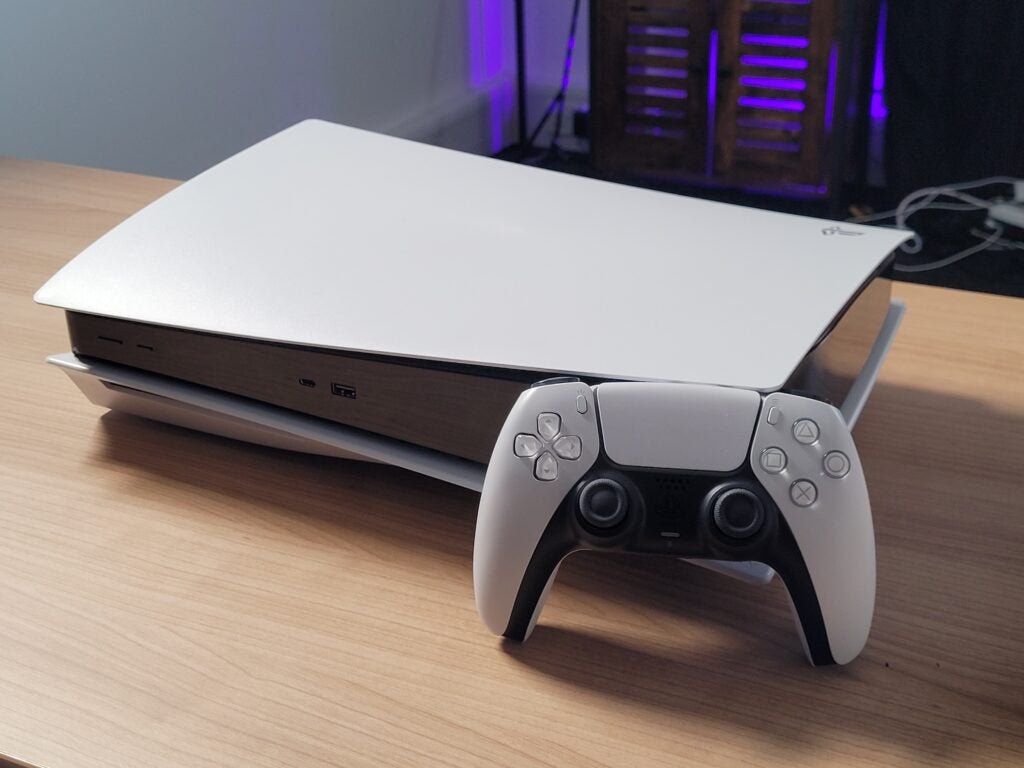
On the console itself you’ll see a simplistic selection of buttons and inputs. The front is home to a single USB-A 3.0 port and a USB-C port. You could make a case that Sony should have added extra USB ports here, especially if you own a PlayStation VR 2 and want to charge up the two Sense controllers simultaneously.
Move downward and you’ll see the power and eject buttons, which are no less easier to tell apart than they were on the PS4. These sit embedded in a layer of plastic, which is great at attracting fingerprints – and likely scratches, if you’re trying to insert devices into the USB slot without looking.
Around the back is the power input, an Ethernet cable port and two additional USB 3.0 ports, which will be perfect for accepting charging cables or connecting dongles belonging to a Bluetooth headset or similar accessories. Three is arguably the magic number, although I did find myself having to swap things out when transferring games onto the internal SSD via an external hard drive.
If you’re not a fan of the white-and-black look, you’ll be happy to know that the white slabs of plastic on either side of the PS5 are easily removable. Not only does this grant immediate access to the console’s innards for dust removal and replacement of the NVMe SSD storage, but it also allows you to replace the white plates with a host of different designs that Sony now offers as separate accessories. This means you can return to the traditional all-black look should you wish, with other official options including a Galactic Purple colourway and grey camouflage print.
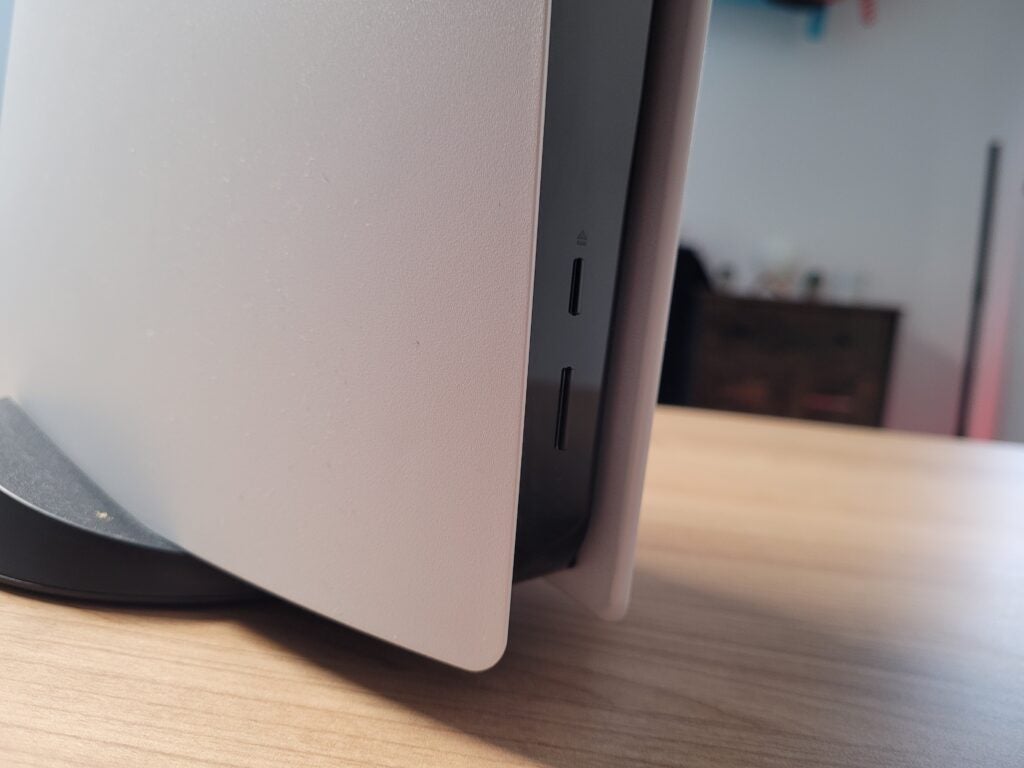
It’s great to see that Sony has designed this console to be customisable, which has already led to some fun limited-edition bundles. Sadly, none of that is enough to detract from the PS5’s obtrusive size, which I still feel is likely to prove an inconvenience when trying to find a home for it in any modern setup.
The console can be placed either horizontally or vertically in the included stand, which itself feels quite cumbersome to locate without fear of scratching the polar white exterior. Compared to the Xbox Series X, the overall build quality here feels like a notable step backwards. Microsoft’s console feels like a premium device in every way, while the PS5 feels toy-like and delicate, and might struggle in terms of form factor to sit alongside existing hardware.
The machine is dominated by plastic on all sides, which makes it feel relatively cheap. Fortunately, the lacklustre build quality doesn’t translate across to the DualSense controller (now also available in a variety of different colours), which is a beautiful piece of hardware and easily the console’s highest point. It’s what makes the PS5 feel like a true next-generation platform – but I’ll be diving into exactly how this is achieved later on.
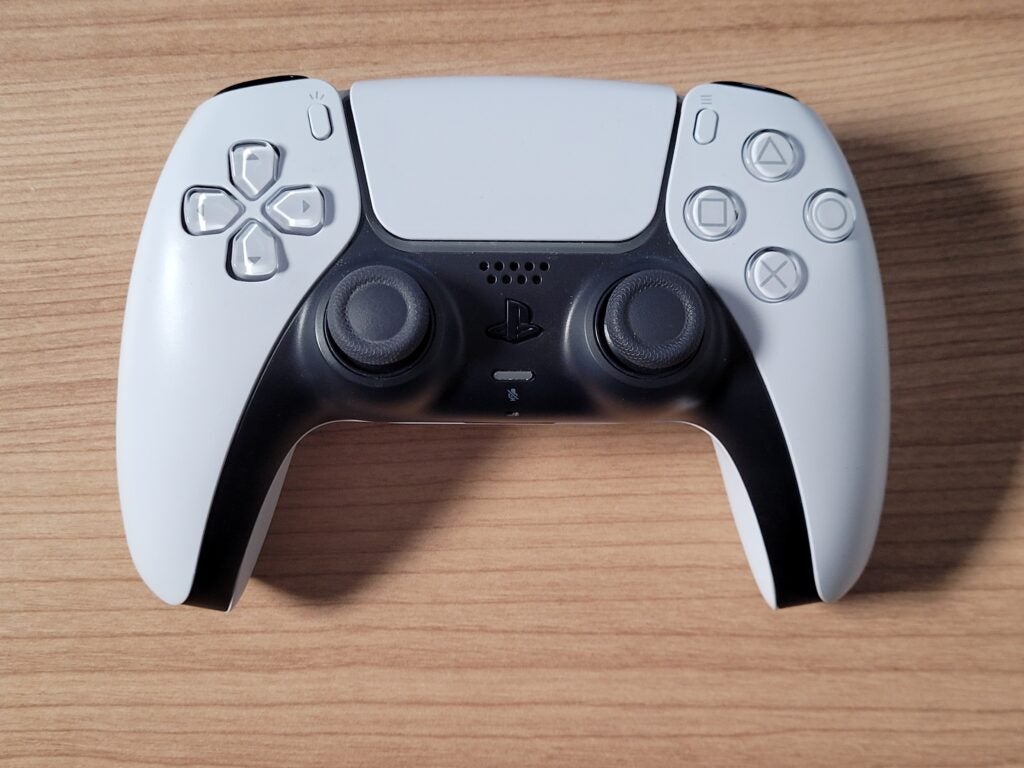
It’s also worth mentioning that the DualSense Edge – PlayStation’s long-awaited answer to the Xbox Elite Controller – is now available to buy. It has highly customisable controls and remappable inputs in addition to the existing DualSense functionality. This pro-level controller isn’t bundled in with the PS5, but it’s still a great option to have if you fancy an upgrade.
Unlike its Xbox rival, the PS5 is a little more flexible when it comes to replacing or upgrading storage. Since launch, Sony has made it possible to expand your base PS5 storage with an M.2 SSD. Once installed, you can freely move games between console storage and the M.2 SSD, and as long as it meets the specified requirements, you won’t suffer any performance downgrades. You will need to remove the PS5’s plates and unscrew a few bolts, but the whole process is pretty painless and didn’t take me more than 30 minutes (and that was being cautious).
Granted, the Xbox expansion cards are a lot faster to set up, but if you buy a large enough SSD for your PS5, you shouldn’t have to break it open again for a while.
Specs and technology
- Features an AMD Zen 2 processor and 10.28 teraflops of GPU power
- NVMe SSD allows for fast loading times and more ambitious games
- 16GB of GDDR6 memory ensures everything runs absurdly smooth
Even when compared to the PS4 Pro, the PS5 is in another league entirely for the sheer horsepower and technical specifications contained within. It’s an incredibly powerful machine, and beyond a few notable omissions, it easily stands shoulder-to-shoulder with the Xbox Series X. Sony has continued to push speed, accessibility and the potential for enhanced visuals and resolution above all else, and the components inside the console more than support that goal.
The PS5 is powered by an AMD Zen 2 processor comprising eight cores running at variable frequencies, with the clock speed topping out at a respectable 3.5GHz. The GPU is also an AMD custom unit, capable of reaching a maximum of 10.28 teraflops at 2.23GHz. The new PS5 Slim doesn’t get a boost to any of these specifications, staying the same in the performance domain.
While the PS5 is capable of displaying jaw-dropping 4K graphics, its performance limitations have been laid bare in recent years. For example, when attempting to run The Witcher 3 in 4K with ray tracing activated, the frame rate will drop drastically, resulting in juddery performance which isn’t ideal. As a result, you’ll usually have to sacrifice either a high resolution or turn ray tracing off completely – it’s a frustrating issue that likely won’t be solved until Sony releases a PS5 Pro, which isn’t guaranteed.
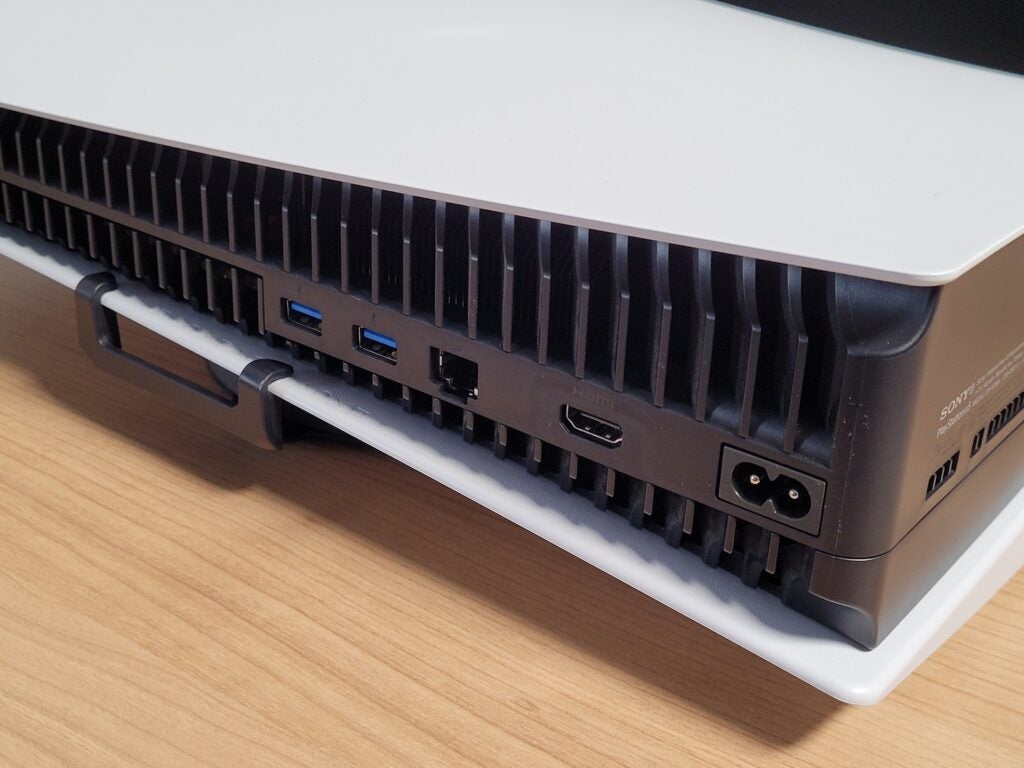
Elsewhere, the PS5 includes 16GB of GDDR6 video memory with an impressive bandwidth of 448GB/s. Sony has also implemented Wi-Fi 6 and Bluetooth 5.1; the former is a little outdated now with the arrival of Wi-Fi 6E, but still allows for outstanding download speeds.
Through my home internet connection, I managed to install a 40GB file in roughly 30 minutes – and the console will blister through a list of downloads with absolute ease, so long as your hard drive has enough space available.
In terms of storage, the PS5 has an 825GB SSD by default, of which a small percentage will be automatically allocated to the system itself, so it can’t be used for games and applications. This leaves you with 667.2 GB to play with. It’s a commendable amount of storage, but I still find myself frequently having to delete games to make room for others. Avid players will definitely want to consider an upgrade in the months to come, but this is fairly easy to do now with an M.2 SSD. Storage is one area in which the newer PS5 Slim model does give you a boost, opting for a 1TB SSD.
3D audio is being hailed as a major feature of the PS5, a feat achieved by the console’s Tempest Engine. This allows for hundreds of simultaneous audio sources to be registered at once, instead of being limited to 50 as in the PS4 and PS4 Pro. Third-party games don’t always make use of the PS5’s 3D capabilities, but in exclusive first-party games, such as Returnal and Ratchet & Clank: A Rift Apart, I’ve seen it used to brilliant effect. You can experience the effect with pretty much any pair of wired headphones, but Sony’s Pulse 3D Wireless headset is an affordable and sonically impressive option for the proper wireless experience.
Graphics and performance
- Loading times are vastly improved on new and existing games
- Demon’s Souls and Astro’s Playroom are stunning launch titles
- Lacks the Quick Resume feature of Microsoft’s new consoles
Games such as Ratchet & Clank: Rift Apart, Gran Turismo 7, Horizon Forbidden West, God of War Ragnarök AND Marvel’s Spider-Man 2 have shown us how good PS5 games can look, even if simultaneous last-gen releases of first-party titles are likely preventing some of them from reaching their full visual potential.
Just like the Xbox Series X, the PS5 is capable of 120fps performance when paired with displays that support HDMI 2.1, although three years into the console’s life, there’s still a relatively small number of games that can reach such echelons of performance right now, and the graphical concessions are often too much for some.
Given its heavy focus on backwards compatibility, I decided to compare the loading times of some of the platform’s biggest exclusives across PS4 Pro and PS5 Pro. The improvements are immediately pronounced, as you can see from the results below. All of the tests were done by loading into a save file directly from the main menu.
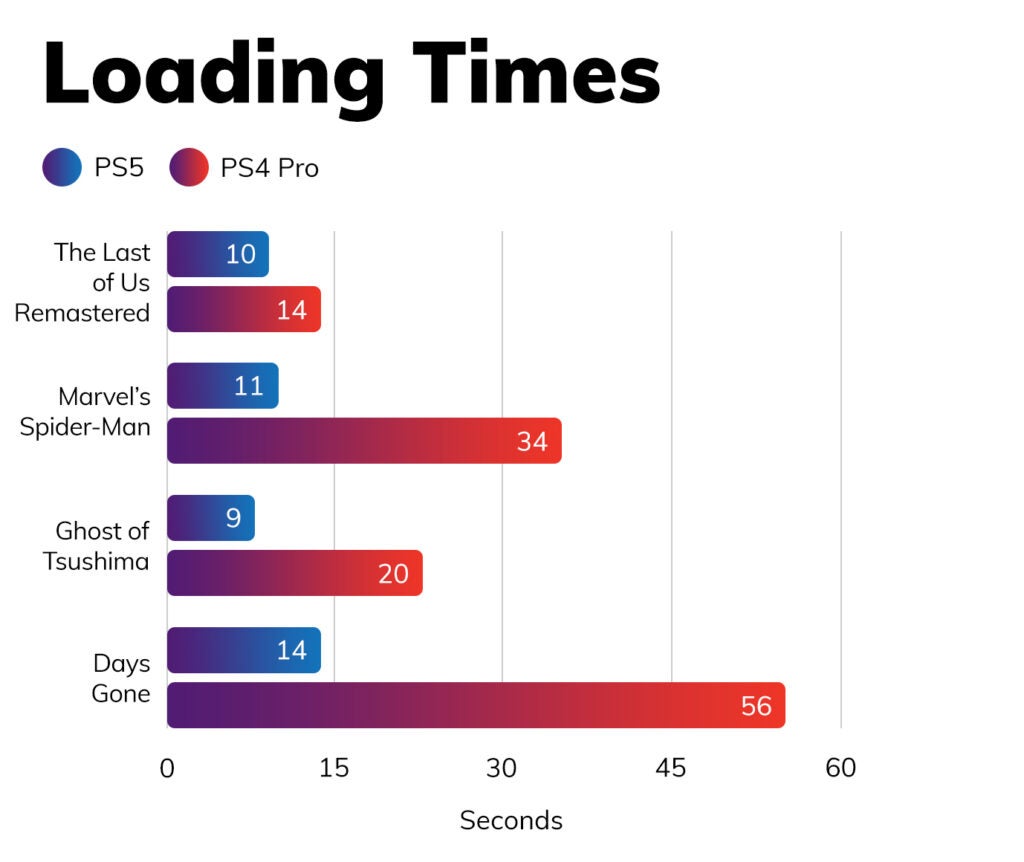
The speed at which you can load existing games is welcome, although it never reaches the heights of Xbox Series X. When comparing the PS5 against Microsoft’s console in a selection of third-party experiences, the latter came out on top every time.
It’s likely that the Series X is far better optimised when it comes to backwards compatibility, while Sony is instead focusing on next-generation experiences. For example, the process of booting up Miles Morales to reach actual gameplay is a mere 7 seconds on PS5.
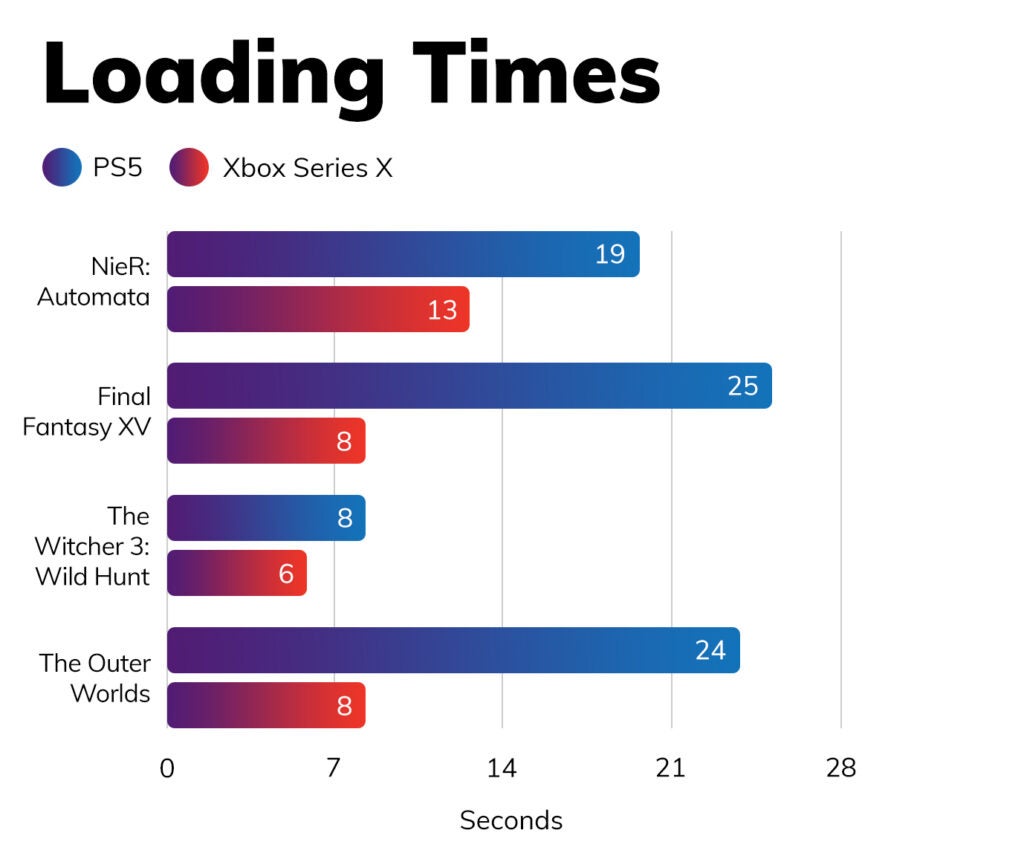
Microsoft’s commitment to backwards compatibility has come home to roost, with the storage architecture and seasoned emulation doing much of the heavy lifting when ensuring that existing titles are dramatically improved on the new console.
A gap of 10 seconds or so in the majority of games may not sound like much, but combined with the lack of a feature such as Quick Resume, it’s significant – especially where I was using the consoles side-by-side over a number of weeks.
Complaints aside, the improvements across the board compared to the PS4 Pro remain very impressive, and sole owners of the PS5 likely won’t notice much of what I’ve addressed here.

But enough about backwards compatibility; you’re likely more interested in how games developed exclusively for the PS5 will make use of the hardware. Insomniac Games’ Spider-Man: Miles Morales, to use an early example, does a phenomenal job of proving how real-time ray tracing and improved performance can alter a gaming experience for the better.
Ray tracing allows developers to implement far more realistic lighting, reflections and other graphical enhancements to their games, reflecting reality far more accurately. This is a step up from the pre-baked solutions we’ve seen up until recently. You can find a direct comparison below, and the differences are night and day.

You’ll notice that the billboards of Times Square now reflect into the glass of buildings, instead of being filled by generic images of skyscrapers. Miles Morales and all of his movements are also recreated two-fold thanks to ray tracing, offering a more nuanced vision of the superhero as he swings through Manhattan.
Upon switching to Performance mode, everything just feels more lifeless by comparison. Granted, it does earn you far more frames per second for more responsive combat and exploration, but I found the gorgeous graphics were more than worth such a sacrifice.
Some games have since introduced a Performance RT mode, which aims for a best of both worlds between higher refresh rates and graphical fidelity to enable ray tracing. While not quite the next-gen dream we were promised, this is about as close as you can get to it on the console right now, where available.
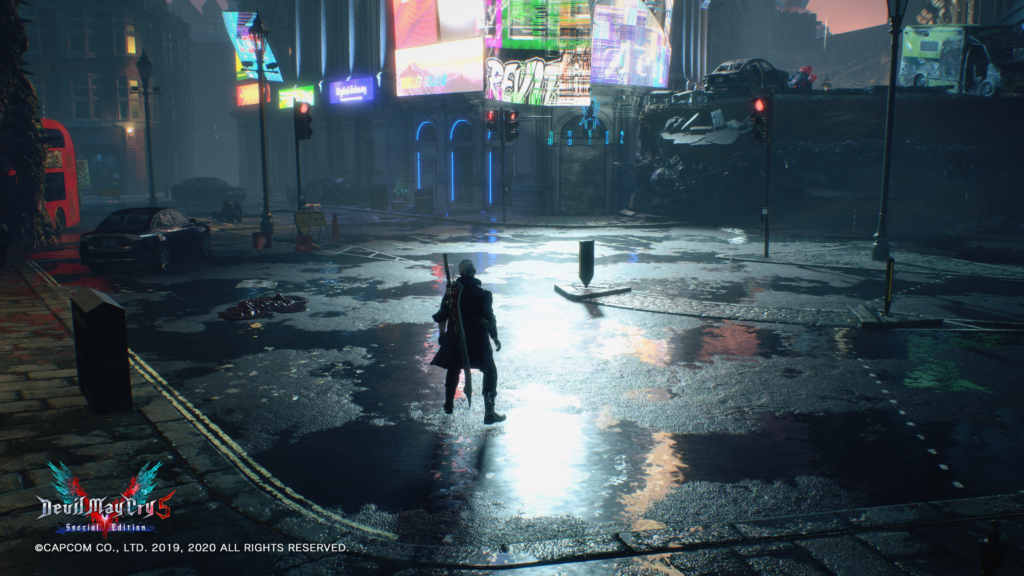
The resolution of reflections in Devil May Cry 5 is notably lower than those in Miles Morales. This can make some instances of the technique look blurry and obtrusive, which takes away from the impact it can have on the lighting in scenes. As you can see from the above screenshots, ray tracing fundamentally alters the mood of the scene, with light sources from the billboards and vehicles reflecting into the puddles and back onto the player.
Without ray tracing, the environment is far darker and lacks vibrancy, with harsh lights from the Piccadilly Circus-esque scene blasting onto the protagonist with little flair. It still looks excellent and expresses the mood of the game well, but ray tracing adds a further dimension to proceedings that simply feels more inviting.
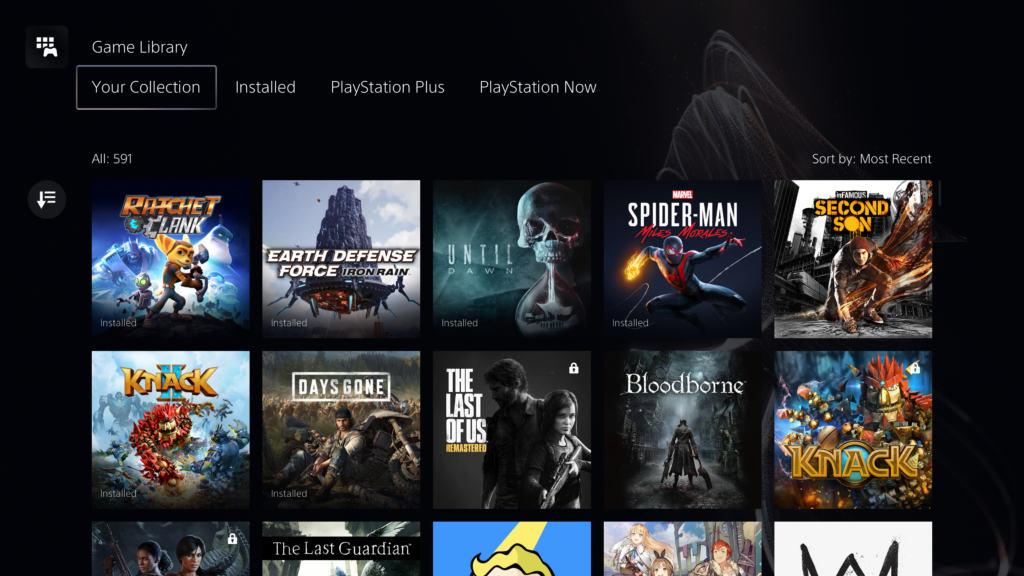
The PS4 and PS4 Pro have become infamous for how loud they are when switched on, so much so that the gaming audio is often drowned out by the abrasive fan noise emanating from the console. It made using them a nuisance, so I’m relieved to confirm that the PS5 is whisper-quiet.
Even when running its most demanding experiences, it hardly makes a peep. It only makes itself heard when installing games from a disc or powering up other Blu-ray media as the 4K drive springs to life. Even here, it’s far calmer than its predecessor.
Controller
- Haptic feedback offers fantastic immersion
- Adaptive triggers can replicate the feel of a bow
- Battery life lasts around 13 hours
The DualSense controller is what really defines the PS5 as a true new-gen platform. It’s a meaningful evolution over the Dualshock 4, introducing new features that, if embraced properly, will no doubt characterise gaming for years to come. The introduction of adaptive triggers and a haptic feedback vibration serve to increase immersion to untold levels. Astro’s Playroom, which comes pre-installed on all PS5 consoles, is the perfect case study for the controller.
Team Asobi’s platformer delivers a masterful introduction to the DualSense controller, implementing haptic feedback and adaptive triggers into a variety of gameplay mechanics. These include springing about the environment and smashing through glass in a futuristic robot suit, or feeling the patter of rain against your little robot’s umbrella through your palms.
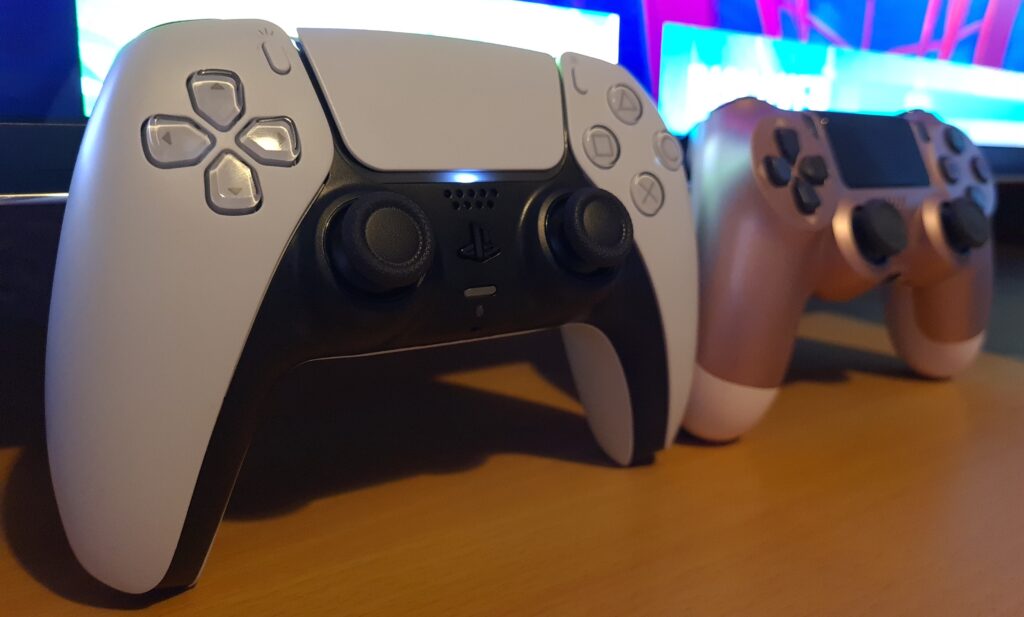
However, some disabled players won’t be able to make use of these features, so Sony makes turning them off super-easy. Haptic feedback and adaptive triggers are used to varying degrees across all of the games I’ve tested so far, but Astro’s Playroom is unquestionably the most impressive, and a title I implore all future owners of the platform to play to completion.
Spider-Man: Miles Morales and Devil May Cry 5: Special Edition have the triggers react to the swing of a web or the slashing of swords, recreating what such actions would feel like in reality using vibration.
As for battery life, the DualSense offers a decent step up from the Dualshock 4. During my testing, it lasted for a maximum of 13 hours and 11 minutes before needing to be plugged in for a charge, which is a colossal improvement over its predecessor. Obviously, mileage will vary depending on what applications are being used.
Software
- User interface is similar to previous consoles
- Dedicated screen for multimedia apps beyond gaming
- Tip videos and Control Centre are meaningful new additions
- New PlayStation Portal accessory for first-party remote play
The PS5’s user interface feels like a natural expansion of what came before it. Sony has kept the tiles that defined the PS4, but has made them smaller and less intrusive, leaving room for spectacular artwork to fill the screen alongside a few menus.
It’s worth noting that the UI renders at a full 4K resolution with HDR for supported displays. As a result, everything pops with absurd levels of detail. It’s sharp, colourful and every single icon reveals elements that simply weren’t as clear before. The console’s horsepower is being put to the test before a game is even launched, and having just dropped £1000 on a new television, I’m certainly not complaining.
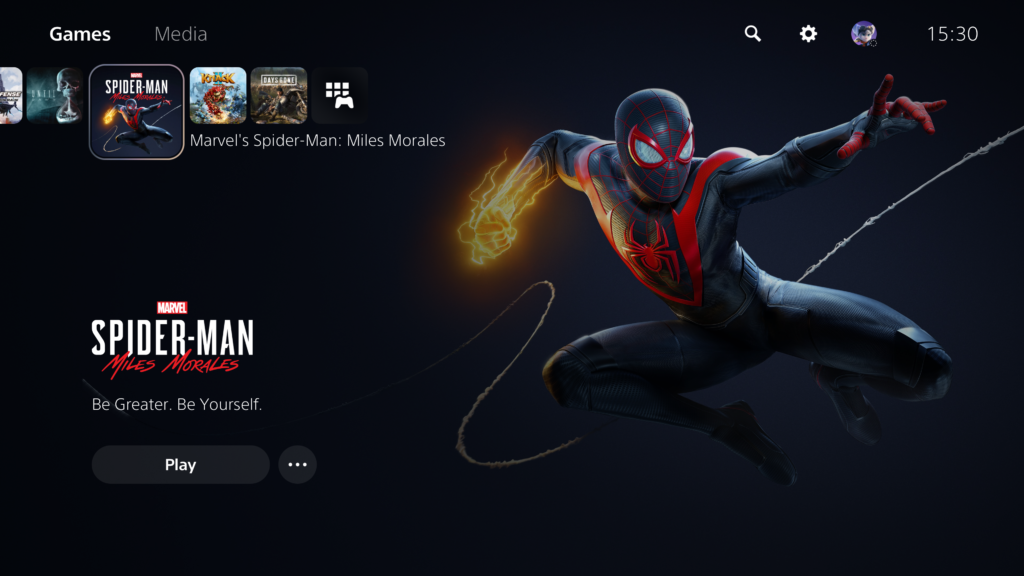
A single press of the PlayStation button will bring up the Control Centre, which is home to all the information you’ll need. Downloads, friends, music, notifications and your own profile are present and can be accessed with ease. The Control Centre can be brought up whether you’re mid-game or on the home screen – and it’s seamless, with no sign of lag even when playing demanding games. You can also customise the icons housed within to fit personal preferences.
In-game, relevant trophies and activities will surface based on what you’re playing. For PS5 exclusives, these will include guides, news and other nifty content that aims to make gameplay more convenient. You can also launch straight into levels from here, once again showcasing the obscene speed of the internal SSD. Sony has iterated on the PS5’s UI since launch, making it easier to explore Activity Cards more specific to your interests from the home screen, while Trophy lists are now more quickly accessible. The PS5 is definitely a machine for the completionists.
The PlayStation Store on PS5 was a bit underwhelming in the console’s early days, lacking features such as deals, offers and genre categories that made its predecessor such a pleasure to browse. PS5, PS4 and VR games had their own distinct sections, but they were little more than sprawling lists that can only be sorted into a few unhelpful variations. The experience has improved somewhat since then, but it’s still not the nicest store to browse, and Sony’s attempts to make every element of the UI feel integrated, rather than separate from one another, can make navigating the store menus a bit fiddly.
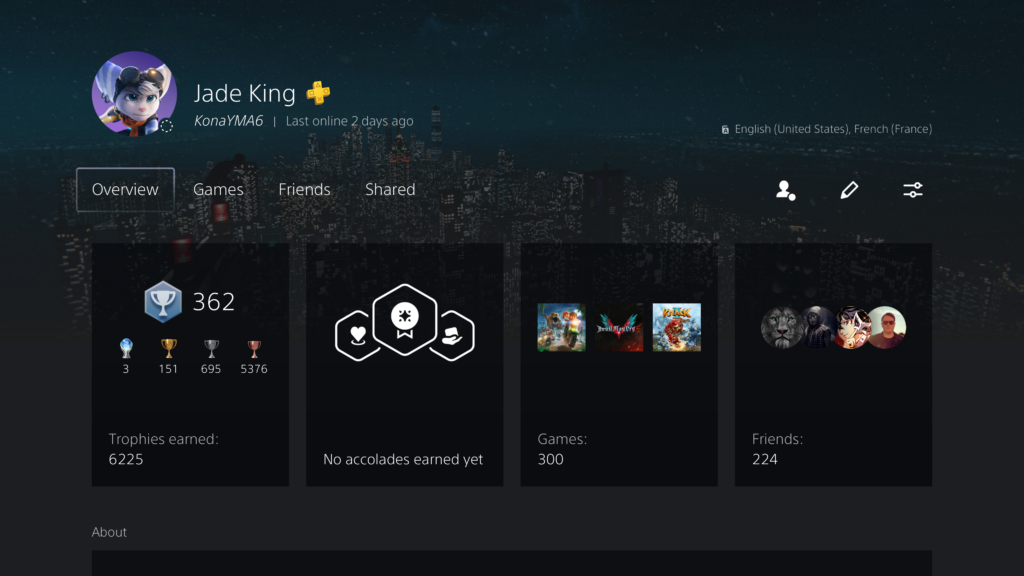
Those who wish to use the PS5 as a multimedia hub can rest easy: all of the expectant bells and whistles are present and accounted for. At launch some of the confirmed media apps include Netflix, Disney Plus, Crunchyroll, Apple TV+ and YouTube. You can also bring up Spotify when using the majority of games and applications.
In its current state, only a select number of titles can be kept on the home screen at once, with your latest applications cycling in and out depending on usage. Folder support for organising your library was absent at launch but has arrived in an update. Sony is now calling folders Gamelists, but the idea is the same. Themes have seemingly been abandoned in favour of the high-resolution artwork that accompanies each game. It isn’t the end of the world, but having been such a core part of the PS4, I’ve sorely missed these elements of personalisation.
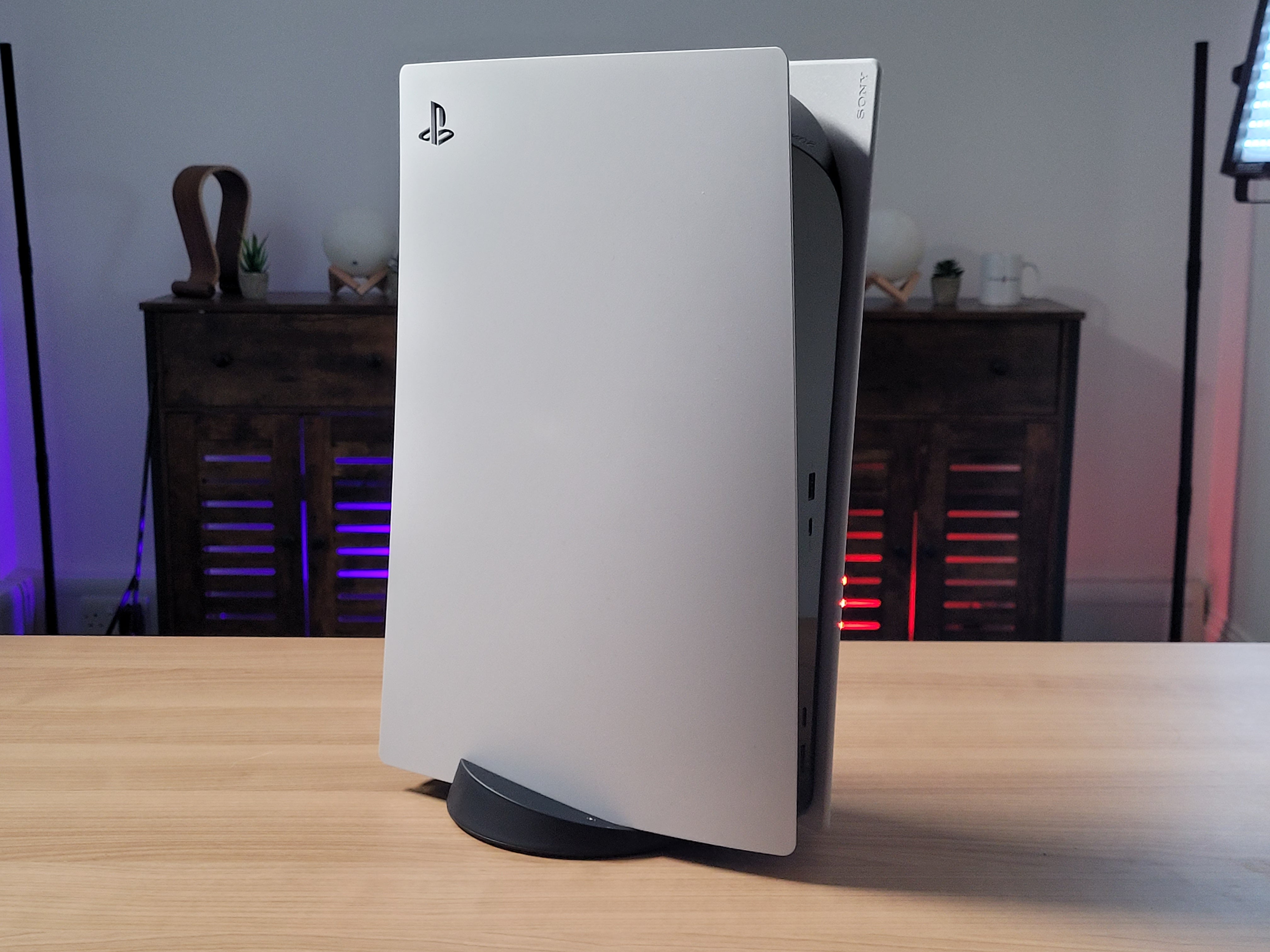
Sony is constantly adding new software features to the PS5 too. One of the most recent additions is the ability to use a voice assistant to load up games or navigate the dashboard, in a similar fashion to how you’d use Alexa with an Amazon Echo. It is admittedly temperamental in its current state, as will often mistake a normal conversation as someone calling out the wake word ‘Hey, PlayStation’.
Fortunately, you are able to deactivate this feature, so it’s entirely optional. I’m sure there will be plenty of people who won’t be a fan of a voice assistant, but it’s still great to see Sony experimenting with new ways to interact with the console.
PS Plus
- Allows you access to huge catalogue of older PlayStation games
- Still lags behind Game Pass in terms of value
If there’s one clear area where PlayStation continues to lag behind Microsoft, it’s in its subscription offering, despite the PS Plus service being completely overhauled in 2022.
PS Plus now comes in three tiers: Essential, Extra and Premium. The first of these is PS Plus as it existed before, granting you access to monthly free games and the PlayStation Plus Collection, a catalogue of 20 of the most popular PS4 titles that can be downloaded and played on the PS5 or the older hardware.
Upgrade to PS Plus Extra and you also get the Game Catalogue, a library of some 400 games that span this generation and the one before it. All of these games can be downloaded and are yours to keep for as long as you’re a PS Plus member. The top tier, PS Plus Premium, goes even further with a selection of retro PlayStation titles that go as far back as the original PlayStation console.
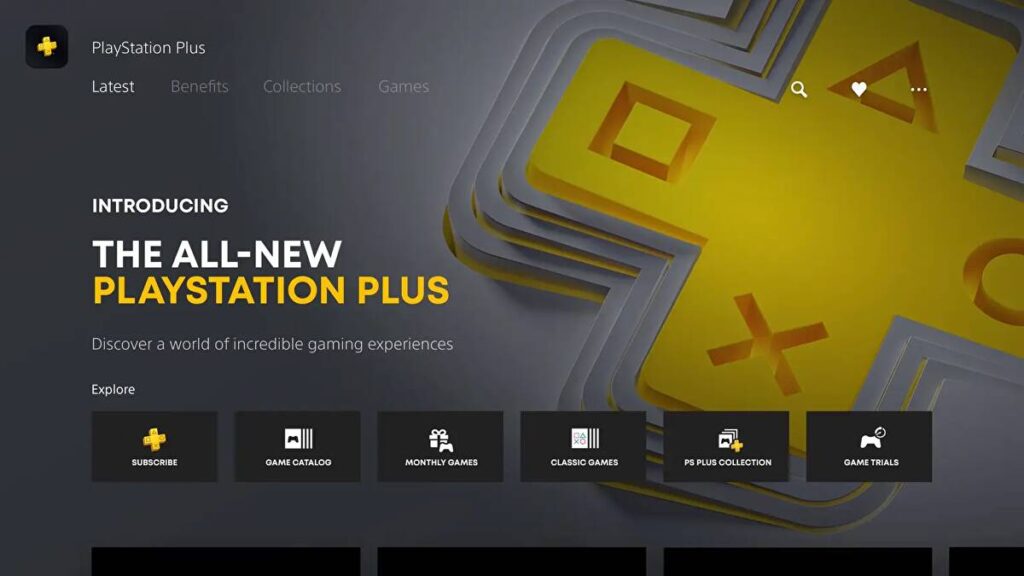
If that sounds like Sony’s answer to Xbox Game Pass, then you’re not wrong, but PS Plus’ Extra and Premium tiers are nowhere near as much of a no-brainer right now. Granted, the Game Catalogue is an absolute treasure trove of gaming (particularly if you missed out on the previous generation), but unlike Microsoft, Sony won’t be putting first-party PS5 titles on the service at launch. If you want to play them right away, you’ll still be paying upwards of £70 for the likes of God of War Ragnarök on top of your PS Plus subscription.
As for PS Plus Premium, while the prospect of being able to play PS1, PS2 and PS3 games in one place is undoubtedly appealing, the classic title library is seriously lacking right now, and PS3 games are only playable via streaming, which is really disappointing. In October, Sony also added PS5 game streaming, with 4K, to the console but it still has a lot of ground to gain on Xbox Cloud Streaming.
PlayStation VR
- VR offering is a unique strength for PlayStation
- Offers incredibly immersive experience
- Expensive optional accessory
Aside from the game catalogues, the PS5 and Xbox Series X are so similar that it’s difficult to separate them. But one key advantage that Sony offers is support for VR. The PS5 is compatible with both the PlayStation VR and PlayStation VR 2 headsets.
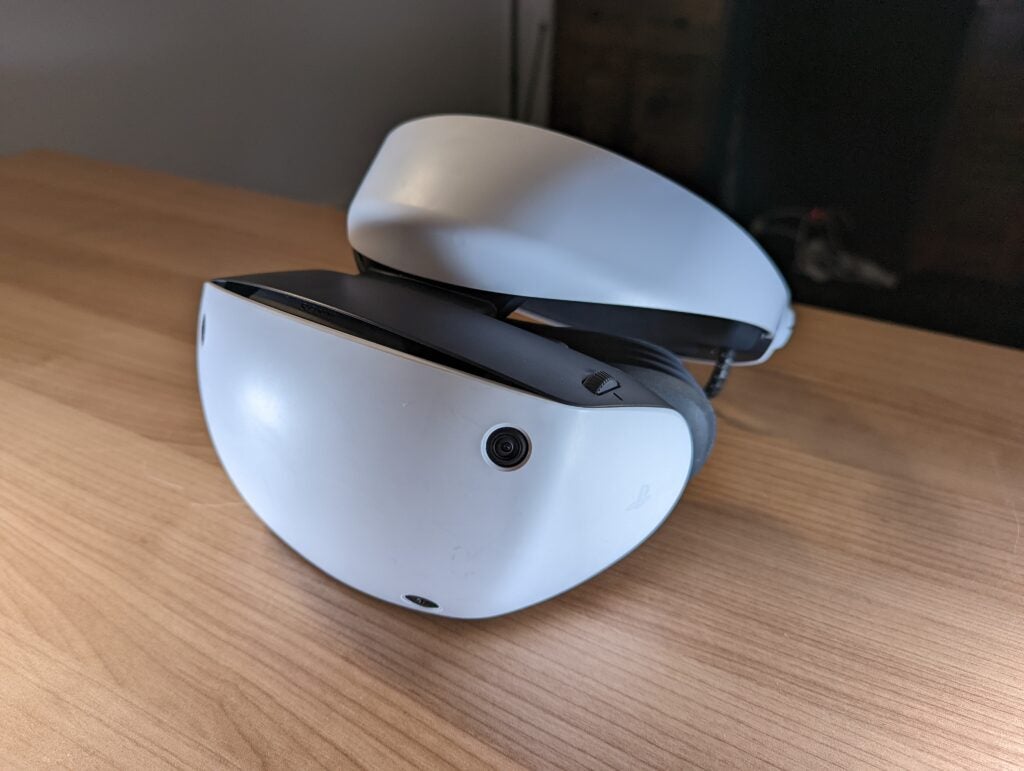
The latter only launched in 2023, and already has a decent game library, including Horizon Call of the Mountain, Resident Evil Village, No Man’s Sky, Star Wars: Tales From The Galaxy’s Edge, Thumper and Rez Infinite.
The PlayStation VR 2 offers one of the best VR experiences yet, with a stunning 4K OLED screen, immersive haptic feedback and cutting-edge eye-tracking technology. It does need to be tethered to a PS5 at all times though, which means the wire can be a real tripping hazard.
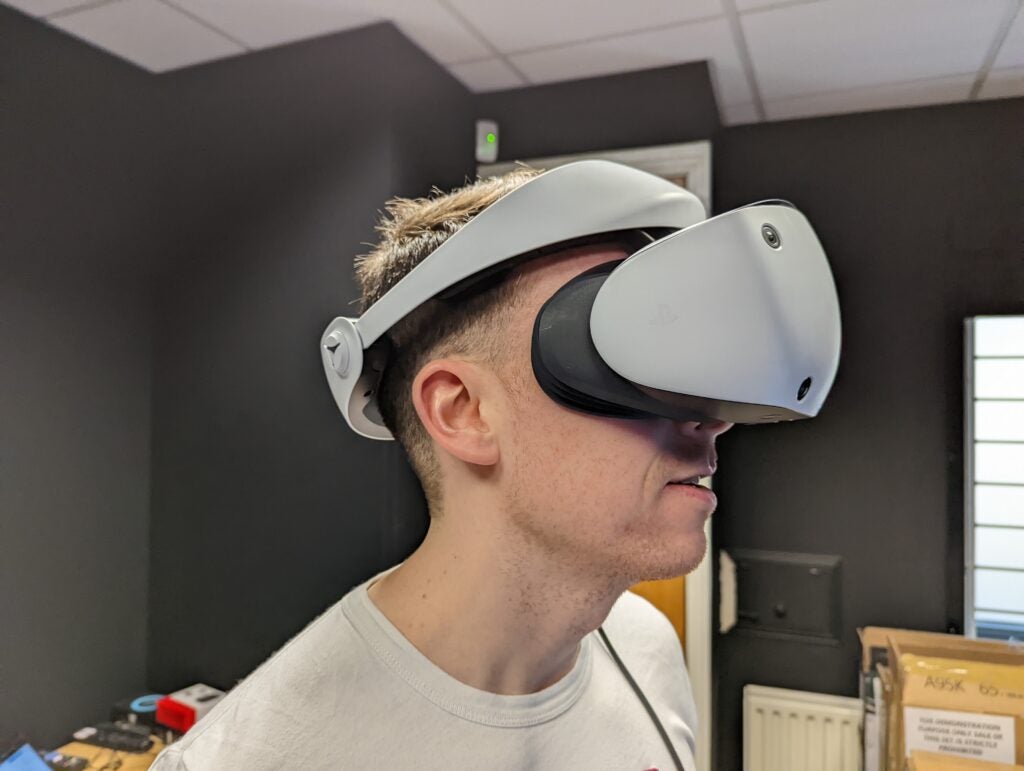
The main stumbling block here is the price: you need to buy the PlayStation VR 2 headset separately at a whopping price of $549.99/£529.99. That makes the VR headset even more pricey than the PS5 console itself, and so is realistically going to have niche appeal.
But it’s nevertheless an advantage over the Xbox, especially if you’ve ever wanted to dip your toe into virtual reality, and crave a more high-end experience than what the Meta Quest 2 offers. Although we wouldn’t recommend buying the PS5 for the sole purpose of playing VR – check out our best VR headset list for more options.
Latest deals
Should you buy it?
You want a powerful PlayStation experience
Features like higher frame rates and ray tracing make the PS5 feel truly new-gen (to console gamers at least), while the DualSense is an amazing controller that really enhances games when used well.
You’re still happy with the PS4 Pro
With a few exceptions, most of the PS5’s best games can also be played on PS4, and the next-gen experience often comes with concessions anyway.
Final Thoughts
The PS5 is a beast of a console and more exciting out of the box than the Xbox Series X. The controller is amazing, and with ray tracing, games like Marvel’s Spider-Man 2 and Ratchet & Clank: Rift Apart look incredible. Support for the PlayStation VR 2 and PlayStation Portal also opens up more doors that aren’t available with Xbox or Nintendo.
That said, Sony’s own games often ask you to choose between fidelity and frame rate, where I originally thought we’d be able to have it all. The price rise is also hard to ignore, especially when the Xbox Series X gives you better value for money with Game Pass.
However, this original model is now old news, with Sony refreshing the PS5. The new PS5 “Slim” offers a more compact body as well as a boost to storage along with improved I/O. The difference isn’t huge but if you’re looking for a new PS5, you may as well buy the new slimmer model unless this older one is available at a significantly discounted rate.
How we test
In order to test the PS5, we played a number of games and compared its performance to rival consoles such as the Xbox Series X.
We’ve also made sure to check the latest firmware updates and design alterations to make sure this review is up-to-date for modern-day buyers.
Played multiple games to test performance
Compared performance to the Xbox Series X, Series S and PS4 Pro.
FAQs
At the time of writing, the PS5 is not capable of outputting 8K in games or any other form of media. However, Sony has said “PS5 is compatible with 8K displays at launch, and after a future system software update will be able to output resolutions up to 8K when content is available, with supported software.
Yes, the PS5 has WIFI 6 meaning it will be able to communicate with compatible routers for much faster download and upload speeds than all of the consoles before it. But it doesn’t offer support for the newer WiFI 6E standard.
Yes the PS5 is capable of playing the large majority of PS4 games both physically and digitally. Some have even been upgraded to support enhanced performance and resolution on the new console. PS Plus Premium also provides access to older games PlayStation’s catalogue.
The PS5 is expensive, currently offers a very similar game library to the PS4 and isn’t quite powerful enough to play modern games in 4K with ray tracing activated without seeing a noticeable drop to the framerate. It’s also hard to ignore the steep cost of new games, especially when Microsoft is releasing first-party games on its Xbox Game Pass subscription service from day one.
Jargon buster
GPU
The graphics processing unit is designed to render graphics, which is particularly important for gaming, creating 3D models and editing video.
Ray Tracing
Advanced light-rendering technology that allows for more realistic lighting and shadow effects within in-game worlds.
FPS
‘Framerate per second’ indicates how many images are shown within one second. The higher this figure, the smoother in-game motion will appear. Powerful discrete GPUs are far more likely to offer higher framerates compared to integrated graphics housed inside processors.
3D Audio
A new feature which aims to make audio in games more immersive by having the sounds from each game surround the player in a three-dimensional way.
SSD
Known as Solid State Drive, this is a faster form of a memory than a standard hard drive. Results in faster loading times and more ambitious games.
HDR
HDR stands for High Dynamic Range and refers to contrast (or difference) between the brightest and darkest parts of an image. HDR content preserves details in the darkest and brightest areas of a picture, details that are often lost in old imaging standards. HDR10 is mandated to be included on all HDR TVs. It’s also supported by 4K projectors.


















